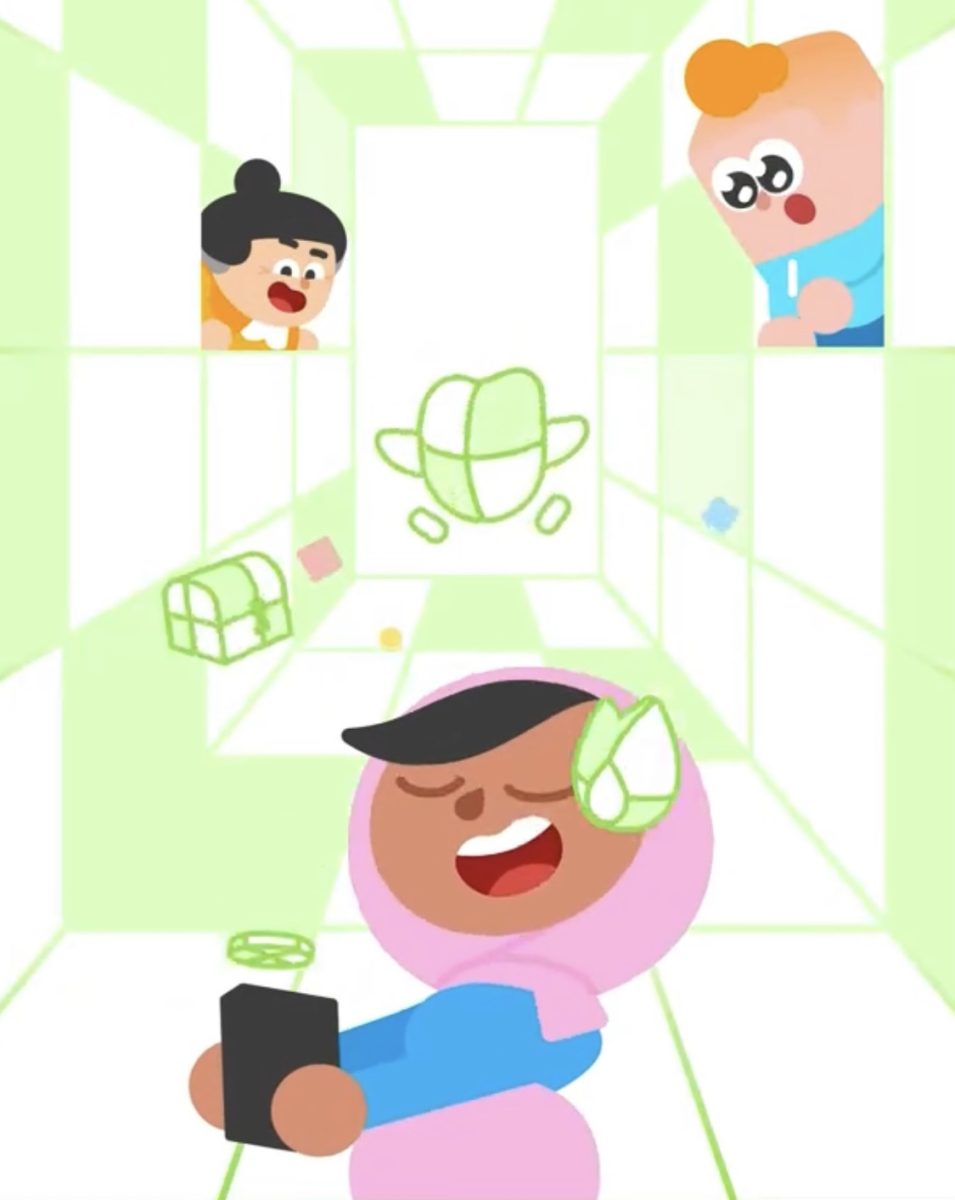There is a phenomenon happening across the nation in restaurants, coffee shops, and malls. Friends are hanging out and ping! One friend pulls out her phone. As her fingers race across the screen, she apologizes but says there is something important she has to do.
Eyes glazed over, she starts speaking into her phone. “La manzana y la leche, por favor.”
Rather than taking her latest BeReal or snapping pictures for Snapchat streaks, she is engaging with a little green owl that incessantly reminds her to practice her Spanish or face its wrath. She knows how much time she spends using the app. And yet, multiple times a day, her finger continues to gravitate towards the little square icon, frantic not to lose her streak.
This friend might not be a real person, but there are millions like her around the world.
Duolingo, founded in 2011, is an education technology company that provides language learning services to its 500 million users throughout the world. With more people learning a foreign language than ever before, technological advancement plays a large role in the increased access to language learning. However, there is more to the story of Duolingo’s rise to become the world’s most downloaded education app than simply being accessible. And one of the major reasons is its game-like design.

In 2012, at the time of Duolingo’s launch, its gamified approach to education was unusual. The app was part of the wave of scholastic games like Kahoot and Prodigy Math being introduced to the public in the 2010s. Today, the gamification of learning is mainstream, being used and encouraged by schools across the nation. However, unlike other EdTech games, the steady growth of Duolingo has been accompanied by an increasing population of users who declare that they have a Duolingo “addiction.”
When it comes to social media and video games, the manipulative tactics they use to retain users are commonly known and often studied. However, when education apps try to make themselves addictive, or “sticky”, there comes the debate between it being a good addiction or a bad addiction.
Gamification
Duolingo’s software employs numerous methods to make language learning akin to gaming, including features such as levels, XP, special events, and leaderboards.
In the competitive leagues, you can see all other users’ progress at all times and they can see yours, making progress in the app into a competition with other users. “For those who are particularly competitive,” Dr. Romayne Gadelrab, Consultant Psychiatrist and Clinical Research at the National Centre for Gaming Disorders, told the School of the New York Times, “it may cause them some distress if unable to continue their use and keep their high score.”
Christopher Maxcy, Vice President of Business Development at Google, is a daily user of Duolingo with a streak of around 660 days. His wife is Brazilian and his kids speak Portuguese in the house, so he started out using Duolingo to improve his Portuguese.
 “I was the top of the top of the top league […] when he was using the app for over an hour each day,” said Maxcy. At the time, his thought process was “a manic ‘oh my God, I have to stay at my level.’”
“I was the top of the top of the top league […] when he was using the app for over an hour each day,” said Maxcy. At the time, his thought process was “a manic ‘oh my God, I have to stay at my level.’”
Each time a lesson is completed, the app gives users XP, gems (lingots), special reward chests, and a happy mascot. Duolingo rewards the ones who work hard and complete lessons with a dopamine rush similar to one video games provide when you win a game.
There is also an in-game shop with purchasable power-ups as well as a premium Super Duolingo subscription. Dr. Gadelrab explains that once you have invested money into the app, it makes it difficult to stop even if it is causing you problems.
Social-Mediafication

People don’t expect to make friends on a learning app, but that is exactly what Duolingo wants people to do. Each account comes with the ability to set a profile picture, follow and be followed by other users, along with adding friends via Facebook. On your profile, your statistics are laid out for others to view and evaluate, turning your in-game progress into social currency.
Many platforms often exchange and copy ideas for user retention, but Duolingo has consistently modeled itself after social media apps. In particular, Duolingo uses the concept of daily streaks that closely resemble the streaks popularized by Snapchat, a feature often associated with obsessive behavior.

Unlike most online “addictions” to social media such as Snapchat or Instagram, which have historically been shown to impact teens’ mental health, Duolingo is a positive alternative when people feel the urge to scroll. The app also helps people engage with education and improve their academic performance.
However, many of the consequences associated with the overuse of social media can also be found with Duolingo usage. Specifically, Duolingo’s use of guilt-tripping can lead to users’ self-esteem decreasing and the app leads to more time spent earning XP rather than fulfilling the purpose of the app: to learn a language. Dr. Gadelrab theorizes that one result of addictive tactics is “the detriment of other parts of their life, affecting their relationships, or ignoring their homework or work tasks in favor of achieving in the addictive educational tool.”
Duolingo has become notorious for its manipulative tactics. Its mascot, a green owl named Duo, appears crying in your notifications each time you are about to lose your streak. The emotionally-driven notifications are psychological triggers designed to guilt-trip users into returning to the app, creating engaged daily users who turn into paying subscribers. When asked for a comment, Duolingo did not respond.

Duolingo is one among several apps that employ addictive strategies to foster positive habits, such as learning a new language. Some apps promote daily exercise, water consumption, and meditation, all of which fall within the realm of beneficial actions. Unfortunately, when these apps are excessively used and driven by profit-oriented goals, there becomes a power asymmetry between the company and the user.
While Duolingo can be valuable for language learning, maintaining a streak is unlikely to transform users into fluent speakers. Instead, it affects their self-worth, feeling guilty over the animated tears of Duo. If there is a point where users cannot go a day without using Duolingo and experience panic at the thought of breaking their streaks, they may have developed a compulsion. And, if you are in the cycle of a language learning addiction, I advise you to pluck the Duolingo bird and roast it whole.





























